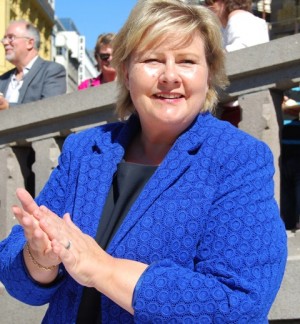Prime Minister Erna Solberg and Finance Minister Siv Jensen were, not surprisingly, included among Norway’s 252 most powerful people in a new book released on Tuesday. The list doesn’t rank those deemed most powerful other than in alphabetical order, but Solberg and Jensen made it into a selection of 25 people from politics, business, labour, academia, culture and the media.

The book was edited by Knut Olav Åmås, a former politician and newspaper editor who’s himself viewed as among Norway’s power elite. He now heads the organization Fritt Ord, which champions freedom of expression, and the book’s editorial team included Kristin Clemet, a former government minister who now heads a conservative think tank; Kjetil Wiedswang, journalist and commentator for newspaper Dagens Næringsliv (DN). and Aksel Braanen Sterri, commentator for newspaper Dagbladet.
Åmås did single out the four positions that often are viewed as Norway’s most powerful: the prime minister, finance minister, the head of employers’ organization NHO and the lead of the country’s largest trade union confederation LO. “Right now, the four most powerful are all women: (Prime Minister) Erna Solberg, (Finance Minister) Siv Jensen, (NHO leader) Kristin Skogen Lund and (LO leader) Gerd Kristiansen, in that order,” Åmås said.
Among others appearing on the list of 25 “most powerful” people were the leaders of Norway’s major political parties, including Solberg, Jensen, Jonas Gahr Støre of Labour, Trine Skei Grande of the Liberals and Knut Arild Hareide of the Christian Democrats. Other top politicians on the list were the head of Oslo’s city government, Raymond Johansen of the Labour Party and Labour’s deputy leader Hadia Tajik.
From the business world came Rune Bjerke, chief executive of Norway’s biggest bank DNB; investor and social media commentator Johan Andresen; the head of Norway’s grocery conglomerate NorgesGruppen, Johan Johansen; the head of Norway’s oil fund Yngve Slyngstad and central bank chief Øystein Olsen. Real estate tycoon Olav Thon, state pension fund boss Olaug Svarva and Sigrun Vågeng, head of state welfare agency NAV, also made the list, as did Thor Gjermund Eriksen, head of state broadcaster NRK.
The book’s editorial team considered more than a thousand candidates before narrowing them down to the list of 252 in the various sectors. From that came the 25 allegedly with the most power. The selection remained somewhat subjective, however, and the list lacked or overlooked the head of Norway’s largest company in its biggest industry, Eldar Sætre of Statoil. He wasn’t viewed as powerful as shipowner John Fredriksen, for example, Norwegian Air CEO Bjørn Kjos or Bjørn Guldvog, head of the state health directorate.
Others making up the list were labour union leaders Hans-Christian Gabrielsen and Stein Lier-Hansen, the head of state statistics bureau Hans Henrik Scheel and Lars Øy, a state secretary in the Office of the Prime Minister and one of Solberg’s key advisers.
newsinenglish.no/Nina Berglund

